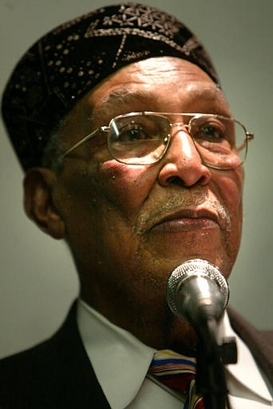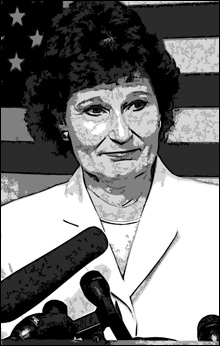Know Your Enemy: Civil Rights Photographer Ernest Williams Exposed as FBI Informant
Famed civil rights photographer doubled as FBI informant
By Michael Calderone
Labels: Articles , Black History , cointelpro
By Michael Calderone
Ernest Withers, a revered civil rights photographer who captured iconic images of Martin Luther King Jr. on the night King was shot in Memphis, actually played a different role the day before: FBI informant.
The Commercial Appeal, a newspaper in Memphis, just completed a two-year investigation that reveals how Withers provided the FBI with details about where King was staying and information on his meeting with black militants on April 3, 1968 — the day before the assassination.
Withers' spying, however, extends far beyond the slain civil rights leader.
The Commercial Appeal found FBI reports indicating that Withers collaborated for years with FBI agents monitoring the civil rights movement. Those FBI reports, the paper's Marc Perrusquia writes, "reveal a covert, previously unknown side of the beloved photographer."
Withers is certainly beloved in Memphis, where a namesake museum is scheduled to open next month. It remains to be seen how these new revelations may affect Withers' legacy.
The Memphis paper reports how Withers' spying assisted J. Edgar Hoover, the controversial FBI director who long covertly monitored King and others considered radicals. Withers, the paper notes, gave the bureau a "front-row seat to the civil rights and anti-war movements in Memphis." In the 1960s, he provided information on everyone from the Invaders — a militant black power group — to church leaders, politicians and business owners. Experts believe the FBI paid Withers for spying.
D'Army Bailey, a retired Memphis judge and former activist once watched by the FBI, told the paper that such covert tactics are "something you would expect in the most ruthless, totalitarian regimes."
http://news.yahoo.com/s/yblog_upshot/20100914/pl_yblog_upshot/famed-civil-rights-photographer-doubled-as-fbi-informant
Labels: Articles , Black History , cointelpro
Award-Winning Journalists and Community Organizers visit Boston
Nationwide tour comes to region, highlighting struggles on the Gulf Coast after Hurricane Katrina, as well as other social justice issues
encuentro 5, 33 Harrison Avenue, Floor 5, Boston
T Stops: Chinatown and Downtown Crossing
The Community and Resistance Tour is an exciting project organized by several book publishers and independent media makers. The tour brings a multimedia presentation involving short films, inspiring speakers, and exciting dialogue. Organizers hope to communicate about current social justice struggles, from nooses hung in the northern Louisiana town of Jena to women organizing inside prisons, from battles around school privatization to post-Katrina community organizing and cultural resistance. “This tour is for anyone interested in issues of health care, education, criminal justice, housing, or the ways in which racism and other forms of systemic oppression intersect with these struggles,” says tour participant and author Jordan Flaherty.
Tour participants include: Award-winning journalist Jordan Flaherty, who has reported from the Gulf Coast for a range of publications, including the New York Times, Al-Jazeera, and Huffington Post; and former prisoner and author of Resistance Behind Bars: The Struggles of Incarcerated Women, Victoria Law. See below for more detailed information on tour speakers.
Jordan Flaherty is a journalist and community organizer based in New Orleans. He was the first journalist with a national audience to write about the Jena Six case, and played an important role in bringing the story to worldwide attention. His new book is FLOODLINES: Community and Resistance from Katrina to the Jena Six, and audiences around the world have seen the news segments he’s produced for Al-Jazeera, TeleSur, GritTV, and Democracy Now. Jordan has appeared as a guest on a wide range of television and radio shows, including CNN Morning, Anderson Cooper 360, CNN Headline News, Grit TV, and both local and nationally-syndicated shows on National Public Radio. As a white southerner who speaks honestly about race, Jordan Flaherty has been regularly published in Black progressive forums such as BlackCommentator.org and Black Agenda Report, and is a regular guest on Black radio stations and programs such as Keep Hope Alive With Reverend Jesse Jackson.
Victoria Law is a writer, photographer and mother. After a brief stint as a teenage armed robber, she became involved in prisoner support. In 1996, she helped start Books Through Bars-New York City, a group that sends free books to prisoners nationwide. In 2000, she began concentrating on the needs and actions of women in prison, drawing attention to their issues by writing articles and giving public presentations. Since 2002, she has worked with women incarcerated nationwide to produce Tenacious: Art and Writings from Women in Prison and has facilitated having incarcerated women's writings published in larger publications, such as Clamor magazine, the website "Women and Prison: A Site for Resistance" and make/shift magazine. Her book Resistance Behind Bars: The Struggles of Incarcerated Women (PM Press 2009) is the culmination of over 7 years of listening to, writing about and supporting incarcerated women nationwide and resulted in this former delinquent winning the 2009 PASS (Prevention for a Safer Society) Award.
Labels: Events , Katrina , Social Justice
encuentro 5, 33 Harrison Avenue, Floor 5, Boston
T Stops: Chinatown and Downtown Crossing
The Community and Resistance Tour is an exciting project organized by several book publishers and independent media makers. The tour brings a multimedia presentation involving short films, inspiring speakers, and exciting dialogue. Organizers hope to communicate about current social justice struggles, from nooses hung in the northern Louisiana town of Jena to women organizing inside prisons, from battles around school privatization to post-Katrina community organizing and cultural resistance. “This tour is for anyone interested in issues of health care, education, criminal justice, housing, or the ways in which racism and other forms of systemic oppression intersect with these struggles,” says tour participant and author Jordan Flaherty.
Tour participants include: Award-winning journalist Jordan Flaherty, who has reported from the Gulf Coast for a range of publications, including the New York Times, Al-Jazeera, and Huffington Post; and former prisoner and author of Resistance Behind Bars: The Struggles of Incarcerated Women, Victoria Law. See below for more detailed information on tour speakers.
Jordan Flaherty is a journalist and community organizer based in New Orleans. He was the first journalist with a national audience to write about the Jena Six case, and played an important role in bringing the story to worldwide attention. His new book is FLOODLINES: Community and Resistance from Katrina to the Jena Six, and audiences around the world have seen the news segments he’s produced for Al-Jazeera, TeleSur, GritTV, and Democracy Now. Jordan has appeared as a guest on a wide range of television and radio shows, including CNN Morning, Anderson Cooper 360, CNN Headline News, Grit TV, and both local and nationally-syndicated shows on National Public Radio. As a white southerner who speaks honestly about race, Jordan Flaherty has been regularly published in Black progressive forums such as BlackCommentator.org and Black Agenda Report, and is a regular guest on Black radio stations and programs such as Keep Hope Alive With Reverend Jesse Jackson.
Victoria Law is a writer, photographer and mother. After a brief stint as a teenage armed robber, she became involved in prisoner support. In 1996, she helped start Books Through Bars-New York City, a group that sends free books to prisoners nationwide. In 2000, she began concentrating on the needs and actions of women in prison, drawing attention to their issues by writing articles and giving public presentations. Since 2002, she has worked with women incarcerated nationwide to produce Tenacious: Art and Writings from Women in Prison and has facilitated having incarcerated women's writings published in larger publications, such as Clamor magazine, the website "Women and Prison: A Site for Resistance" and make/shift magazine. Her book Resistance Behind Bars: The Struggles of Incarcerated Women (PM Press 2009) is the culmination of over 7 years of listening to, writing about and supporting incarcerated women nationwide and resulted in this former delinquent winning the 2009 PASS (Prevention for a Safer Society) Award.
Labels: Events , Katrina , Social Justice
Boston Phoenix - The Reform Proof Prison
By CHRIS FARAONE | September 8, 2010
In March 2004, Kathleen Dennehy was hired as the new Department of Correction (DOC) commissioner. The first woman ever to hold the job, she had served nearly 30 years in the system, working as a deputy commissioner and before that as superintendent of the women's prison in Framingham. The challenges before Dennehy were grave; in August 2003, defrocked Catholic priest and serial child rapist John Geoghan was strangled to death by a white supremacist in his cell at the Souza Baranowski Correctional Center in Shirley, casting a negative light on the department.
In response to the subsequent uproar, then-governor Mitt Romney and his secretary of public safety, Ed Flynn, tapped Massachusetts Attorney General Scott Harshbarger to head an investigatory panel, the Governor's Commission on Corrections Reform (GCCR). The final Harshbarger report concluded that Geoghan had been severely harassed at Walpole, where the priest was initially held, and that at Shirley, Geoghan had landed in a vulnerable cell block as a result of officers citing him for unwarranted disciplinary infractions.
The Harshbarger report was ugly, and over the next three years, the DOC's Office of Investigative Services struck officers with 312 charges of misconduct, resulting in the firing of more than 100 guards across the department. Seventy-three officers were found guilty of illegally assaulting convicts, and 98 were found to have participated in illicit sexual misconduct with prisoners. The report also proposed strategies for purging the DOC of rogue guards deemed unwilling to accept the department's heightened standards. The Massachusetts Correction Officers Federated Union (MCOFU) fought hard against the DOC's crusade, directing much of its spite at the woman who Romney chose to spearhead the invigorated state prison reform effort.
From the beginning of her tenure as commissioner, Dennehy clashed with union loyalists intent on maintaining the status quo. Reps from the Massachusetts Correction Officers Federated Union (MCOFU) declined to show up at initial meetings to draft a new department vision statement, and, five months after Dennehy's start, officers hit her with a vote of no confidence. But in the years that followed, until Governor Patrick replaced her with Harold Clarke in 2007, it got worse: Dennehy reported that her car tires were slashed during one prison visit; union members followed her with an inflatable rat and hired private investigators to pursue her; and an underground officer newsletter caricatured the commissioner performing oral sex.
| READ: "Troubled Over Bridgewater," by Chris Faraone |
One proposed change that was met with vitriol by union members pertained to system-wide disciplinary and grievance processes. Historically, convict complaints had little chance of reaching DOC administrators beyond prison walls, as each facility operated as its own fiefdom in which investigations of prisoner abuse were discreetly addressed or completely ignored. Dennehy sought increased accountability, not only in how grievances were handled, but for officers who abused their power. Only third party DOC administrators, she believed, could admonish rogue officers.
Read the Full Story Here: http://thephoenix.com/Boston/news/108112-reform-proof-prison/#ixzz0z289Fvj6
Labels: Articles , Prison Conditions
Subscribe to:
Posts (Atom)












